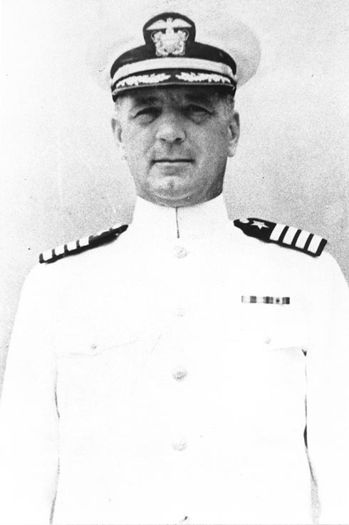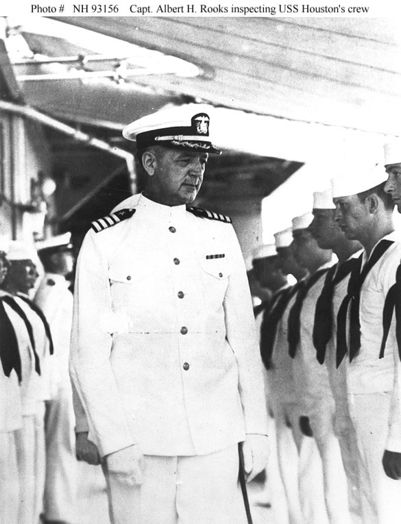ALBERT H. ROOKS, CAPT, USN
Albert Rooks '14
Lucky Bag
From the 1914 Lucky Bag:
Albert Harold Rooks
Walla Walla, Washington
"Rooksey"
EVERYONE is anxious to know the man from Walla Walla—here he is. Right off the fruit farms with memories of all the products of his state—especially the peaches, which he still maintains to be the finest in the country, although there seem to be times when his opinion wavers. Fusser? Just watch him at some hop! Of course it must be the very latest he is dancing with, or you will not appreciate his unusual aptitude. Large, tall, and handsome, is it any wonder that all the girls are simply crazy to meet him? Really "he is the sweetest thing."
Always happy and carefree, Rooksey prefers to sit up reading Omar or some other philosopher, to attempting to gain some knowledge from the ever-present unfathomable depths. In fact he never believes in study unless he is certain he has written the last letter to each of the numerous sources of the scented and tinted envelopes. He is popular and always ready to help anyone out, and his society and friendship are sought by all his classmates. Without him '14 would be minus one of its most valued members and the service an efficient officer.
He has a quiet, military manner which won for him on our first class cruise a recommendation for the highest cadet rank. But the gods willed otherwise and he sports a bird with a small section of the celestial universe upon his right sleeve.
He never suffers from loneliness wherever he is, for, on his long trans-continental trips, he usually disembarks with the fairest ones on board clinging to his arms. Any man with his winning way is greatly quoted, and a reference to "Only two weeks" is sure to cause his angora to graze in the public eye.
Bird and Betelgeux; Football Numerals (2); Near Benedict.

Albert Harold Rooks
Walla Walla, Washington
"Rooksey"
EVERYONE is anxious to know the man from Walla Walla—here he is. Right off the fruit farms with memories of all the products of his state—especially the peaches, which he still maintains to be the finest in the country, although there seem to be times when his opinion wavers. Fusser? Just watch him at some hop! Of course it must be the very latest he is dancing with, or you will not appreciate his unusual aptitude. Large, tall, and handsome, is it any wonder that all the girls are simply crazy to meet him? Really "he is the sweetest thing."
Always happy and carefree, Rooksey prefers to sit up reading Omar or some other philosopher, to attempting to gain some knowledge from the ever-present unfathomable depths. In fact he never believes in study unless he is certain he has written the last letter to each of the numerous sources of the scented and tinted envelopes. He is popular and always ready to help anyone out, and his society and friendship are sought by all his classmates. Without him '14 would be minus one of its most valued members and the service an efficient officer.
He has a quiet, military manner which won for him on our first class cruise a recommendation for the highest cadet rank. But the gods willed otherwise and he sports a bird with a small section of the celestial universe upon his right sleeve.
He never suffers from loneliness wherever he is, for, on his long trans-continental trips, he usually disembarks with the fairest ones on board clinging to his arms. Any man with his winning way is greatly quoted, and a reference to "Only two weeks" is sure to cause his angora to graze in the public eye.
Bird and Betelgeux; Football Numerals (2); Near Benedict.
Loss
Albert was lost when USS Houston (CA 30) was sunk on on March 1, 1942 during the Battle of Sunda Strait. He was the ship's commanding officer.
Biography
From Wikipedia:
Albert Harold Rooks was born in Colville, Washington, on December 29, 1891. He entered the United States Naval Academy as a midshipman July 13, 1910, and was commissioned in the rank of ensign upon graduation on June 6, 1914. During the next seven years, among them the First World War years of 1917–18, he served in several ships, including USS West Virginia (ACR-5), USS St. Louis (C-20). He commanded the submarines USS Pike (SS-6), USS B-2 (SS-11), USS F-2 (SS-21), and USS H-4 (SS-147).
In 1921, Lieutenant Rooks joined the staff of the Twelfth Naval District, at San Francisco, California, remaining there until 1925, the year he was promoted to lieutenant commander. He next spent three years on board the battleship USS New Mexico (BB-40), followed by duty at the U.S. Naval Academy. In 1930, he helped commission the new cruiser USS Northampton (CA-26) and served on her until 1933, when he returned to the Naval Academy for a second tour.
In February 1936 Commander Rooks placed the new destroyer USS Phelps (DD-360) in commission and remained as her commanding officer until 1938. His next assignment was as a student at the Naval War College, and, upon completion of his studies, he served on that institution's staff. He was promoted to the rank of captain on July 1, 1940, while still at the War College. In 1941 Rooks took command of the heavy cruiser USS Houston (CA-30), flagship of the Asiatic Fleet. He took his ship through the painfully difficult first three months of the Pacific War, when the Asiatic Fleet and its British and Dutch counterparts fought desperately against an overwhelming Japanese onslaught into Southeast Asia, the Philippines and the East Indies. Both Houston and her commanding officer were lost in the Battle of Sunda Strait, on March 1, 1942.
Captain Rooks posthumously received the Medal of Honor for "extraordinary heroism, outstanding courage, gallantry in action and distinguished service in the line of his profession as Commanding Officer of the USS Houston during the period of 4 to February 27, 1942, while in action with superior Japanese enemy aerial and surface forces." During this period Houston survived six air attacks and one major naval engagement, doing considerable damage to the enemy while being heavily damaged herself in one air attack and in the naval engagement. Captain Rooks died on the bridge as a result of enemy-inflicted wounds and went down with his ship after her courageous fight against overwhelming odds.
From researcher Kathy Franz:
Albert was appointed to the Naval Academy by Senator Wesley Jones in April 1910. Albert left high school to take preparatory school conducted by a former officer of the academy.
Albert’s father was steward at the state penitentiary in Walla Walla. His sister Edna Bernadine married professional baseball player, Wallace “Wally” James Hood, Jr., in October 1922.
His wife, Edith, was listed as next of kin. He has a memory marker in Washington.
Medal of Honor
From Hall of Valor:
The President of the United States of America, in the name of Congress, takes pride in presenting the Medal of Honor (Posthumously) to Captain Albert Harold Rooks (NSN: 0-8625), United States Navy, for extraordinary heroism, outstanding courage, gallantry in action and distinguished service in the line of his profession, as Commanding Officer of the U.S.S. HOUSTON (CA-30), during the period 4 to 27 February 1942, while in action with superior Japanese enemy aerial and surface forces in the Netherlands East Indies. While proceeding to attack an enemy amphibious expedition, as a unit in a mixed force, HOUSTON was heavily attacked by bombers; after evading four attacks, she was heavily hit in a fifth attack, lost 60 killed and had one turret wholly disabled. Captain Rooks made his ship again seaworthy and sailed within three days to escort an important reinforcing convoy from Darwin to Koepang, Timor, Netherlands East Indies. While so engaged, another powerful air attack developed which by HOUSTON'S marked efficiency was fought off without much damage to the convoy. The commanding general of all forces in the area thereupon canceled the movement and Captain Rooks escorted the convoy back to Darwin. Later, while in a considerable American-British-Dutch force engaged with an overwhelming force of Japanese surface ships, HOUSTON with H.M.S. EXETER carried the brunt of the battle, and her fire alone heavily damaged one and possibly two heavy cruisers. Although heavily damaged in the actions, Captain Rooks succeeded in disengaging his ship when the flag officer commanding broke off the action and got her safely away from the vicinity, whereas one-half of the cruisers were lost.
Service: Navy
Division: U.S.S. Houston (CA-30)
Photographs
Circa 1940-1941. From Wikipedia
Twelfth Naval District Headquarters, San Francisco, California Officers of the headquarters staff, December 1923. Those present are (front row, left to right): Captain Stanford E. Moses, USN, Assistant to the Commandant; Rear Edward Simpson, USN, Commandant, 12th Naval District; Captain George H. Barber, USN(MC), and Captain Ammen Farenholt, USN(MC). (rear row, left to right): Chief Pharmacist William T. Gildberg, USN; Lieutenant Errol W. Willet, USN(DC), (possibly); Lieutenant John H. Buchanan, USN; Lieutenant Commander John P. Bowden, USN; Lieutenant Albert H. Rooks, USN; Lieutenant Lyman K. Swenson, USN; Commander Albert S. Rees, USN, and Commander John Irwin, USN(SC). U.S. Naval History and Heritage Command Photograph.
The "Register of Commissioned and Warrant Officers of the United States Navy and Marine Corps" was published annually from 1815 through at least the 1970s; it provided rank, command or station, and occasionally billet until the beginning of World War II when command/station was no longer included. Scanned copies were reviewed and data entered from the mid-1840s through 1922, when more-frequent Navy Directories were available.
The Navy Directory was a publication that provided information on the command, billet, and rank of every active and retired naval officer. Single editions have been found online from January 1915 and March 1918, and then from three to six editions per year from 1923 through 1940; the final edition is from April 1941.
The entries in both series of documents are sometimes cryptic and confusing. They are often inconsistent, even within an edition, with the name of commands; this is especially true for aviation squadrons in the 1920s and early 1930s.
Alumni listed at the same command may or may not have had significant interactions; they could have shared a stateroom or workspace, stood many hours of watch together… or, especially at the larger commands, they might not have known each other at all. The information provides the opportunity to draw connections that are otherwise invisible, though, and gives a fuller view of the professional experiences of these alumni in Memorial Hall.
January 1915
January 1916
January 1917
March 1918
January 1919
January 1920
January 1921
January 1922
May 1923
July 1923
September 1923
November 1923
January 1924
March 1924
May 1924
July 1924
September 1924
November 1924
January 1925
March 1925
July 1925
October 1925
January 1926
October 1926
January 1927
April 1927
October 1927
January 1928
April 1928
July 1928
LCDR Norman Scott '11
LCDR Cassin Young '16
LT John Gillon '20
LT John Burrow '21
LT Joseph Hubbard '21
LT Edwin Crouch '21
LTjg Howard Healy '22
LTjg William Ault '22
October 1928
January 1929
April 1929
July 1929
October 1929
January 1930
April 1930
October 1930
January 1931
April 1931
July 1931
October 1931
January 1932
April 1932
October 1932
January 1933
April 1933
July 1933
LCDR Charles Cecil '16
LT Robert Smith '20
LT Paul Register '21
LT George Brooke '21
LT Howard Healy '22
1LT Charles Kail '23
LT Hallsted Hopping '24
LTjg Lawrence McPeake '24
LTjg James Smith, Jr. '25
LTjg Knowlton Williams '25
October 1933
LCDR Charles Cecil '16
LT Robert Smith '20
LT Paul Register '21
LT George Brooke '21
LT Howard Healy '22
1LT Charles Kail '23
LT Hallsted Hopping '24
LTjg Lawrence McPeake '24
LTjg William Graham, Jr. '25
LTjg Andrew Harris '25
LTjg James Smith, Jr. '25
April 1934
LCDR Charles Cecil '16
LT Robert Smith '20
LT Paul Register '21
LT William Gray '21
LT George Brooke '21
LT Howard Healy '22
1LT Charles Kail '23
LT Hallsted Hopping '24
LT Lawrence McPeake '24
LTjg William Graham, Jr. '25
LTjg Andrew Harris '25
July 1934
LCDR Charles Cecil '16
LT Paul Register '21
LT William Gray '21
LT George Brooke '21
LT Howard Healy '22
LT Edward Metcalfe '22
LT Eugene Elmore '22
1LT Charles Kail '23
LTjg William Graham, Jr. '25
LTjg John Graff '26
October 1934
LCDR Charles Cecil '16
LT Paul Register '21
LT William Gray '21
LT George Brooke '21
LT John French '22
LT Howard Healy '22
LT Edward Metcalfe '22
LT Eugene Elmore '22
1LT Charles Kail '23
January 1935
LCDR Charles Cecil '16
LT Paul Register '21
LT William Gray '21
LT George Brooke '21
LT John French '22
LT Howard Healy '22
LT Edward Metcalfe '22
LT Eugene Elmore '22
1LT Charles Kail '23
April 1935
LCDR Charles Cecil '16
LT Paul Register '21
LT William Gray '21
LT George Brooke '21
LT John French '22
LT Howard Healy '22
LT Edward Metcalfe '22
LT Eugene Elmore '22
LTjg Heywood Edwards '26
LTjg John Reybold '26
October 1935
January 1936
April 1936
July 1936
January 1937
April 1937
September 1937
January 1938
July 1938
January 1939
October 1939
June 1940
November 1940
April 1941
Related Articles
Lyman Swenson '16 was also on the staff of the Twelfth Naval District in December 1923.
Namesake
USS Rooks (DD 804) was named for Albert; the ship was sponsored by his widow.
Other
Albert's papers and correspondence is in the archive of the University of Houston Libraries.

The "category" links below lead to lists of related Honorees; use them to explore further the service and sacrifice of alumni in Memorial Hall.




